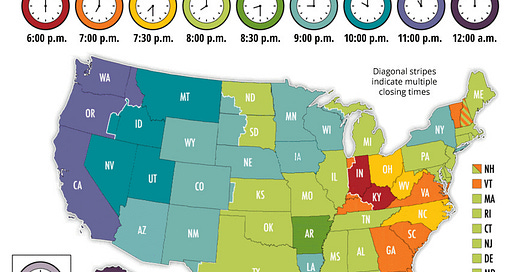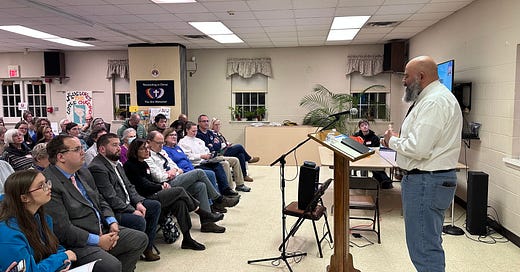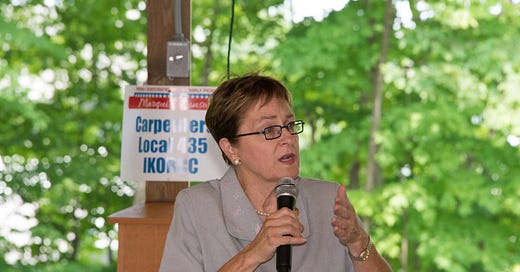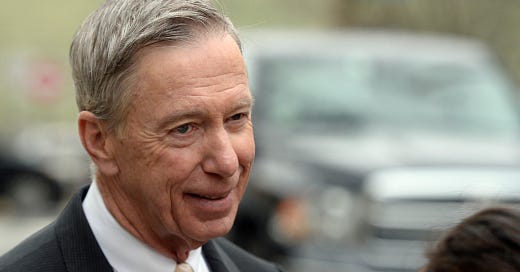Morning Digest: Join us tonight for our complete election coverage, starting at 6 PM ET!
And follow the returns with The Downballot community on our Discord server
Leading Off
Election Day
Election Day is here! After analyzing hundreds of races over the last two years, we're extremely eager to cover them live tonight. And the best way to follow our coverage is to join The Downballot's private Discord server. You'll just need to upgrade to a paid subscription (an email will follow with instructions for accessing the server):
If you're already a paid subscriber but haven't signed up for our Discord yet, just click the button below:
Our coverage will begin at 6 PM ET, when the first polls close in the eastern parts of Indiana and Kentucky.
Speaking of which, we have a ton of election-related resources that will help you get up to speed:
Our famous poll closing times map, sponsored by 314 Action! That's the map you see at the top of this post, but at the link, we also have versions for every U.S. time zone, plus a few others. Print it out and tape it up by your computer or TV!
Our Big Board, which summarizes all of the most important downballot elections and highlights potentially competitive "races to watch." Note that each tab has a different group of races (Senate, House, and so on).
Our deep-dive guides explaining the most interesting contests for state legislature and state supreme court, as well as the path to electing the president by popular vote in time for the 2028 elections.
Our final pre-election podcast, featuring our hour-by-hour guide to Tuesday's top races.
Also, if you haven't yet, you still have a chance to enter our election prediction contest for the chance to win some exceptionally delicious babka.
We'll see you later tonight for the main event!
Governors
PR-Gov, PR Ballot
Puerto Rico will elect a new governor today, and a win for former Sen. Juan Dalmau would represent a major break from the two parties that have long dominated the island.
Dalmau is running as part of an alliance―known formally as Alianza de País, or Alliance for the Country―between the Puerto Rican Independence Party, which wants Puerto Rico to separate from the United States, and the Citizen Victory Movement, which has focused on appealing to younger voters.
The governorship is open because Gov. Pedro Pierluisi badly lost the June primary to serve as the standard bearer for the pro-statehood New Progressive Party to Resident Commissioner Jenniffer Gonzalez, who has served as Puerto Rico's non-voting member of Congress since 2017.
The New Progressive Party, which is often referred to by its Spanish acronym, PNP, includes politicians who also belong to both of the mainland's major parties, and Pierluisi and Gonzalez were on opposite sides of that divide. Pierluisi caucused with the Democrats in the eight years he preceded Gonzalez as resident commissioner, while Gonzalez is a Republican.
The Popular Democratic Party, which supports Puerto Rico maintaining its current commonwealth status and tends to align with the Democratic Party, has long represented the main alternative to the PNP. (Like its rival, the party is commonly known by its Spanish acronym, PPD.) However, recent polls suggest that its nominee for governor, Jesus Manuel Ortiz, who is a member of the House of Representatives of Puerto Rico, is nowhere close to victory.
Most of these surveys have shown Gonzalez leading Dalmau, though one poll gave him a slim edge. Ortiz, meanwhile, takes a distant third place, while two other candidates after further behind.
Dalmau, who does not identify with either the Democrats or the Republicans, hopes to harness voter frustration with anger over the status quo. Dalmau and his supporters have highlighted corruption scandals, frequent energy blackouts, the rising cost of living, and a shortage of physicians to make their case for change.
One well-known ally is Benito Antonio Martinez Ocasio, better known as Bad Bunny. The megastar reggaetón artist attracted widespread attention last month when he responded to Donald Trump's instantly infamous rally at Madison Square Garden rally by endorsing Kamala Harris, but he's also taken an active role in the race to replace Pierluisi.
Bad Bunny, reports the Associated Press' Danica Coto, has bought billboards attacking both the PNP and PPD, though he's devoted more attention to going after Gonzalez's side. Bad Bunny also appeared at a Dalmau rally on Sunday, and though he insisted he wasn't making an endorsement, he made it clear who he was rooting for. The PNP, Coto writes, has reacted to the star's intervention by buying "a billboard ad suggesting an obscenity in reference to Bad Bunny."
On the same ballot, voters will also weigh in on a non-binding referendum concerning the territory's legal status. They'll be asked if Puerto Rico should become a state; an independent nation; or an independent nation with free association, an arrangement that the United States has with several former Pacific territories. Unlike in prior referendums, there is no option to reaffirm the island's current status as a commonwealth.
This is the seventh time Puerto Rico is holding a status referendum, and just like with prior questions, Congress would need to assent to any change in Puerto Rico's status. Republicans, however, have said that they'd block any attempt to make it a state.
Remember to become a paid subscriber so that you can access our election night coverage on Discord!
House
Independent Expenditures
The final update to our House independent expenditure tracker prior to Election Day shows Democrats ending the race with a huge spending edge.
Over the last week, the Democratic Congressional Campaign Committee and the House Majority PAC, the two largest spenders in House races on the Democratic side, together shelled out more than $59 million. By contrast, their GOP counterparts, the National Republican Congressional Committee and the Congressional Leadership Fund, put in a shade over $46 million.
That pattern is mirrored in the statistics for the entire general election, which saw the two Democratic groups invest $313 million while the two Republican organizations were responsible for just $252 million. The real gap is even wider, though, because these figures don't account for the enormous fundraising advantage Democratic candidates have enjoyed over their Republican rivals.
Yet despite the enormous sums, the House battlefield is smaller than ever. Two years ago, these "Big Four" groups were involved in 75 different races; this cycle, that number has shrunk to just 54. Some of these contests aren't especially competitive, though, and have seen only limited spending. In just 36 of these districts have both the two Democratic outfits and the two Republican shops each spent at least $1 million.
That narrow battleground has led to an intense concentration: 11 different races have seen at least $20 million in spending from the Big Four, compared to just two that reached that mark in the midterms.
Tipping the scales at almost $27 million, with $14 million from Democrats and $12.7 million from Republicans—is Michigan's 7th District, a swingy seat around the state capital of Lansing that Democratic Rep. Elissa Slotkin left open to run for Senate.
Not only is Michigan's 7th the record-holder for this cycle, it narrowly came in second last time, when the Big Four put in more than $21 million. Slotkin, however, defeated Republican Tom Barrett 52-46, a result that Democrat Curtis Hertel would love to replicate as Barrett seeks this seat a second time.
Mayors & County Leaders
Raleigh, NC Mayor
Five candidates are competing to succeed Mary-Ann Baldwin as mayor of Raleigh, North Carolina, on Tuesday night in a race where it takes a simple plurality to win a two-year term. Only one, however, has brought in a serious amount of money.
That candidate is former state Treasurer Janet Cowell, who was once a rising star in North Carolina Democratic politics before she unexpectedly retired ahead of the 2016 election. Cowell has the support of Baldwin, a fellow Democrat, in the officially nonpartisan race to lead Raleigh, which is the state's capital and second-largest city.
Recent campaign finance reports also show that she also outraised her nearest opponent, Republican Paul Fitts, by a massive $550,000 to $30,000 spread. Democrat Terrance Ruth, a North Carolina State University professor who lost to Baldwin 47-41 in 2022, has taken in even less.
This will also be the last election in the City of Oaks to be conducted under the old rules. Starting in 2026, candidates for mayor and city council will run in nonpartisan primaries, with the top two vote-getters proceeding to the November general election. Future elections for these posts will also be for four-year terms.
Richmond, VA Mayor
Tonight's contest to succeed termed-out Democratic Mayor LeVar Stoney will be one of the most unusual races in the country thanks to Richmond's electoral college-like election rules.
All five candidates running to lead Virginia's capital are competing in an officially nonpartisan race, but the winner may not be the one with the most votes―or even the second-most. That's because candidates need to win a plurality of the vote in at least five of the nine City Council districts―also known as wards―to win the contest outright.
If no one hits that threshold, then the two candidates with the most votes citywide would compete in a runoff on Dec. 17. The winner of that race would be the candidate who carries a majority of the wards rather than wins the most votes.
The city began using this system in 2004―the city council previously picked one of its own to be mayor―but so far, no one has ever won despite losing the popular vote. But why implement this system in the first place?
Venugopal Katta sought to explain this highly unusual approach in a 2017 piece for William & Mary Law School's Election Law Society. In particular, local Black leaders feared that wealthy white voters would have a disproportionate say over who got to lead what was, two decades ago, a majority-Black city. They instead touted this system as a way to ensure that a mayor couldn't win without substantial Black support.
The Richmond Times-Dispatch's Samuel Parker recently interviewed local political expert Bob Holsworth to discuss which of the four major candidates might come out on top in what's now a plurality white―but still loyally Democratic―city.
Holsworth opined that physician Danny Avula, who ran Virginia's COVID vaccination campaign, is the frontrunner because of his strong fundraising and "welcoming, inclusive style and personality." Avula, who grew up in India, would be the city's first Indian American leader. Like all his main rivals, Avula identifies as a Democrat.
Holsworth wasn't as optimistic about the others' prospects, arguing that former City Council president Michelle Mosby, who would be the first Black woman to lead the city, has failed to raise enough money to cost Avula his frontrunner status. Still, he said, Mosby could take enough wards to force Avula into a runoff.
A third alternative, City Councilor Andreas Addison, has brought in even less cash than Mosby. Businessman Harrison Roday, by contrast, has been a strong fundraiser, but Holsworth said that he was too slow to go on TV. Roday did launch a spot late in the campaign faulting Avula for serving as commissioner of social services in the "anti-abortion administration" of GOP Gov. Glenn Youngkin.
The final contender, community organizer Maurice Neblett, has few resources and goes unmentioned in Parker's piece.
Stoney, who is running for lieutenant governor next year, announced last week that he wouldn't make an endorsement because none of his potential successors had "distinguished themselves from the pack." The Richmonder's Graham Moomaw noted back in September that, because all of the candidates have pitched themselves as a departure from the status quo, it's possible none wanted Stoney's support.
Remember to become a paid subscriber so that you can access our election night coverage on Discord!
Sacramento, CA Mayor
Democratic Assemblyman Kevin McCarty enjoys a big advantage in fundraising and institutional support over physician Flojaune Cofer, who is the endorsed candidate of the local chapter of the Democratic Socialists of America, in tonight's contest to succeed retiring Sacramento Mayor Darrell Steinberg.
McCarty outraised Cofer $1 million to $500,000 through Oct. 19, thanks in part to donations from what the Sacramento Bee's Theresa Clift characterizes as "[l]ocal business groups and developers." McCarty—whose social media profile reminds viewers that he's "NOT Kevin McCartHy, Seriously!"—has the support of Steinberg and other notable Democrats like Rep. Doris Matsui.
Cofer, whom Clift says does not identify as a democratic socialist despite DSA's backing, is positioning herself as an agent of change. She began running against Steinberg months before the incumbent announced he wouldn't seek a third term and has several labor groups on her side. She also sports the endorsement of the Sacramento Bee's editorial board, though few local elected officials are supporting her.
Cofer would be the first Black woman to lead California's capital city. Both candidates would also be the second Black person to serve as mayor after Steinberg's immediate predecessor, Kevin Johnson.
Tulsa, OK Mayor
Oklahoma Democrats unexpectedly flipped the mayor's office in Tulsa in August when state Rep. Monroe Nichols and Tulsa County Commissioner Karen Keith both advanced to the general, but the two are now locked in a nasty campaign to succeed retiring Republican Mayor G.T. Bynum.
Nichols, who would be the city's first Black mayor, has argued that Keith is portraying him as weak on crime "because of my race and the perception that folks like me are hostile to law enforcement," according to the Tulsa World.
Keith, likewise, has pushed back on allegations that she knew about sexual abuse accusations at a juvenile detention center, charging that third-party mailers "exploit the horrific abuse of children and is nothing more than a smear campaign." Nichols denied any involvement at a debate last month, but Keith accused her opponent of pushing a "narrative" about the detention center.
Republican Brent VanNorman, who took a close third place in the first round of voting, has made it clear he's rooting for Keith. The commissioner said last month that she'd offer VanNorman a place in her transition committee, an offer VanNorman quickly announced he'd accept.


















THE SELZER WAY: Polling Forward
"I give credit to my method for my track record. I call my method, 'Polling Forward'. I want to be in a place where my data can show me what's likely to happen with the future electorate. So I just try to get out of the way of my data, saying this is what's going to happen.
"A lot of other polls, and I will count Emerson among them, are including in the way that they manipulate the data after it comes in things that have happened in the past. So they're taking into account exit polls, they're taking into account what turnout was in past elections.
"I don't make any assumptions like that, so in my way of thinking, it's a cleaner way to forecast future electorate which nobody knows what that's going to be. But we do know that our electorates change in terms of how many people are showing up, what the composition is, and so I don't want to try to predict what that's going to be. I want to be in a place for my data to show me."
– Ann Selzer
https://www.dailykos.com/stories/2024/11/4/2282388/-J-Ann-Selzer-Busts-Emerson-and-others-for-manipulating-their-polls-on-tv
So it begins. Don't think I'll get much sleep where I am on the other side of the world.
While all eyes will be on Georgia when polls close at 7 pm, Indiana and Kentucky could offer some interesting tea leaves when they start reporting at 6 pm. Both of course should be near-instant calls for Trump, but Kenton County (Cincinnati suburbs) and especially Hamilton County (Indianapolis suburbs) could portend broader trends in the suburbs. Kenton shifted seven points left in 2020, while Hamilton shifted 12 points.